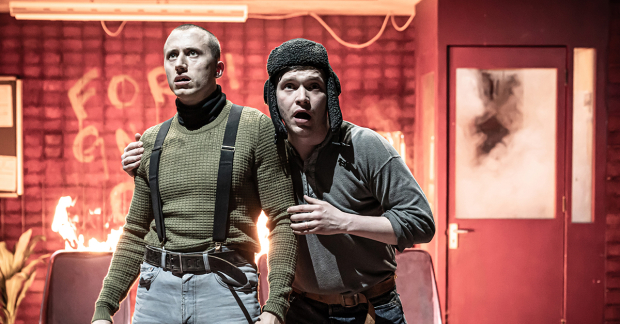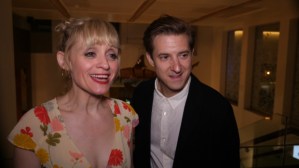Review: Europe (Donmar Warehouse)
David Greig’s play is Michael Longhurst’s first production as artistic director of the Donmar Warehouse

© Marc Brenner
It's astonishing to realise that David Greig's play Europe was written 21 years ago. Its portrait of an unnamed border town where refugees wait for trains that no longer arrive, locals are unmoored and unhinged by the death of the industrial base, and where young people dream of leaving, seems as if it could have been written yesterday.
It's a brilliant choice for the opening of Michael Longhurst's regime as artistic director at the Donmar, and he directs it with a passion and an almost operatic sense of the tides of uncertainty that are sweeping across the lives of the characters – "history has washed across us", they sing. He tugs out its poetry and the sweet sadness that sits beneath a story that unfolds across 20 scenes, each with their own title revealed briefly on the passenger information board of the derelict station where it is set.
That station is in Chloe Lamford's evocative design and Ian Dickinson and Simon Slater's extraordinary soundscape both entirely realistic – those brown tiles on the wall, a tatty office, an echoing station announcement system over which Ron Cook's stationmaster Fret can make increasingly desperate announcements about the non-arrival of the trains – and powerfully metaphoric, with the screeching sounds of a world passing by, and a spectacular display of pyrotechnics towards the close.
This is the place that the refugees (or "economic migrants") Sava (Kevork Malikyan) and his daughter Katia (Natalia Tena) pitch up, and where they make a sort of home, as Fret bustles bureaucratically ("Things must have come to something if the stationmaster can't follow the timetable") and his assistant Adele (Faye Marsay) sits on the roof, dreaming of crossing borders you can't see and visiting lands that are in Europe, but are only names to her.
Gradually new alliances are forged. Sava and Fret are united by their love of trains – "a railway man is a railway man wherever you go" – and Katia's wariness is softened by Adele's offer of friendship and love. Meanwhile, Adele's unhappy husband Berlin (Billy Howle) begins to espouse the anti-immigrant rhetoric of the skinheads who exert their violent influence in the town. Wolves are prowling the woods.
Greig's writing has a dazzling precision. He is often very funny, sometimes on silly subjects – Cook's wonderfully humane Fret has a terrific rant about the way a Polish stationmaster's liking for sausage can delay an entire transcontinental train – and sometimes in darker territory, as in the thug Horse's claim that "the boat people" who have come to his landlocked town to steal the jobs are flown in. But he also picks over with uncanny truthfulness the tensions between staying and leaving, what makes people decide to remain in a place and the varying factors that make them feel they must go.
The acting is terrific too, particularly from Malikyan who lends a calm tenderness to the gentle Sava who understands "the random chaotic winds of current events" but cannot stop them harming him and Marsay's stubbornly defiant Adele. Shane Zaza brings a sense of wonder to the charismatic traveller Morocco, who literally conjures with money, turning it from one thing into another, while Howle exhibits the hurt pride that explains Berlin's ultimate ferocity.
It's a terrific, powerful night, a great contribution to the debate that rages outside this little theatre, but also a notable beginning to Longhurst's tenure within its walls.




















